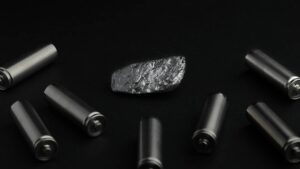Renascor targets Battery Anode Material Study completion by July 2023

The project optimisation study incorporates an increase in purified spherical graphite production capacity. Pic via Getty Images.
Renascor Resources’ optimised Battery Anode Material Study (BAM Study) for its proposed vertically integrated Siviour graphite mine and manufacturing operation in South Australia is now at an advanced stage and, pending completion of revised cost estimates, is expected to be completed in July 2023.
The study is assessing an increase in the Stage 1 Purified Spherical Graphite (PSG) production capacity from 28,000tpa, as well as additional staged expansion of PSG operations.
Following the approval of the Program for Environment Protection and Rehabilitation for its upstream mine and concentrator, the study will also reflect an accelerated commencement of construction of the upstream operation, with procurement of long-lead time items and tendering for front-end engineering and design (FEED) commencing in the current quarter.
Globally competitive Australian-made anode material
“Our technical team is making excellent progress on our updated, optimised Battery Anode Material Study which seeks to increase our projected PSG production capacity to meet the growing demand for graphite in lithium-ion batteries,” Renascor Resources (ASX:RNU) MD David Christensen stated.
“Engineering work on the upstream mining and processing plant is complete and has given us sufficient confidence to commence long-lead item procurement and move to the front- end engineering and design stage.
“We are also nearing completion of engineering and design work on the downstream operation, which will incorporate an increase in production capacity for our eco-friendly, state-of-the-art PSG facility in Bolivar, South Australia.
“We look forward to the completion of the BAM Study and our transition into the construction phase of a long-life operation that will produce globally competitive, 100% Australian-made battery anode material.”
Study scheduled for completion in July
The BAM Study is based on the establishment of the downstream operation at the proposed site in Bolivar, South Australia that Renascor secured last year from South Australian Government-owned utility SA Water.
The process design for the downstream plant continues to be based on a conventional milling process to micronise and spheronise graphite, followed by a purification circuit that avoids the use of hydrofluoric (HF) acid to achieve lithium-ion battery grade PSG.
Downstream engineering deliverables based on the optimised process design were received earlier this month, with ongoing works focused on finalising the water treatment system and electricity supply infrastructure.
Renascor is targeting completion of the optimised BAM Study in July, pending completion of the remaining work programs described above and finalisation of cost estimates.
“While it is anticipated that the estimated capital costs will be subject to inflationary pressures, Renascor expects the improvements in productivity and the strong graphite market outlook will ensure the BAM project will continue to demonstrate robust returns and support a favourable final investment decision later this year,” the company said.
This article was developed in collaboration with Renascor Resources Limited, a Stockhead advertiser at the time of publishing.
This article does not constitute financial product advice. You should consider obtaining independent advice before making any financial decisions.
Related Topics

UNLOCK INSIGHTS
Discover the untold stories of emerging ASX stocks.
Daily news and expert analysis, it's free to subscribe.
By proceeding, you confirm you understand that we handle personal information in accordance with our Privacy Policy.








